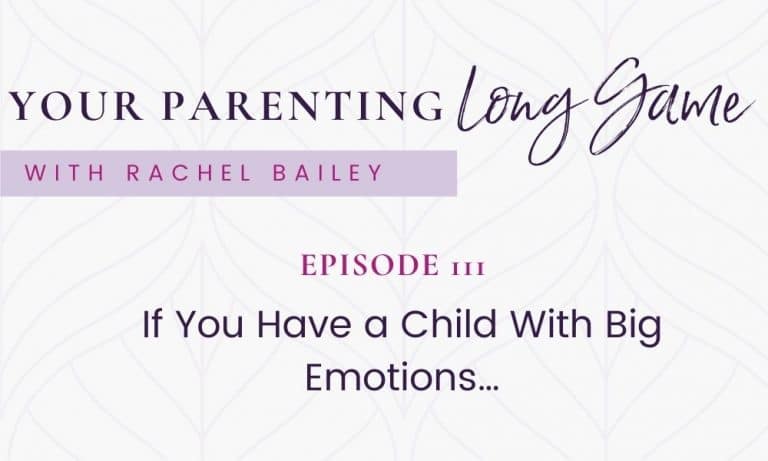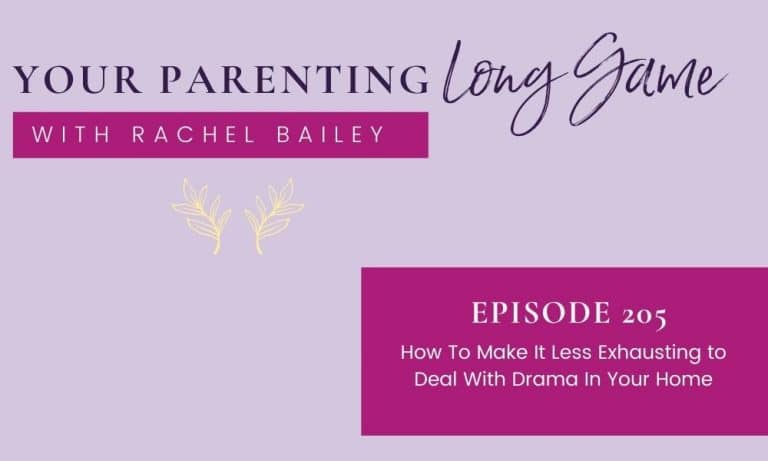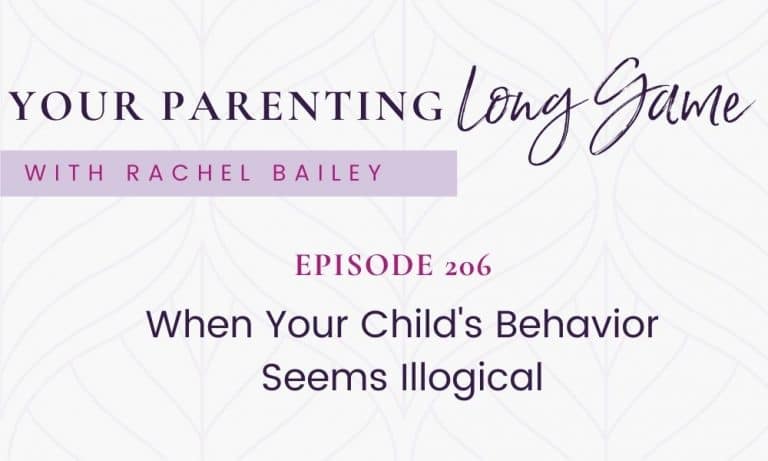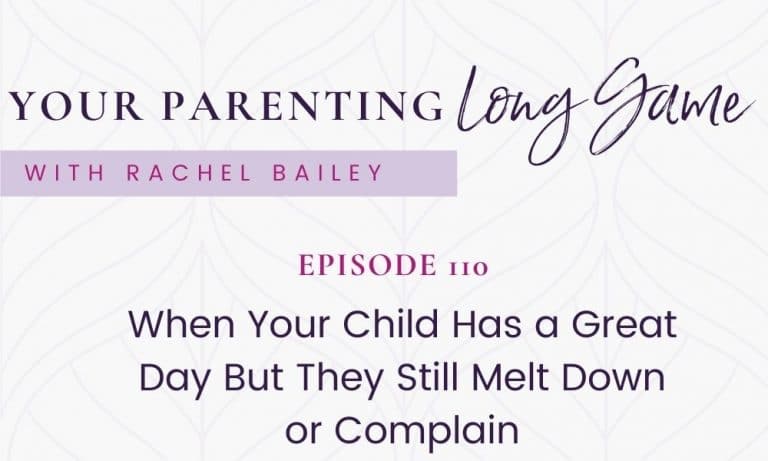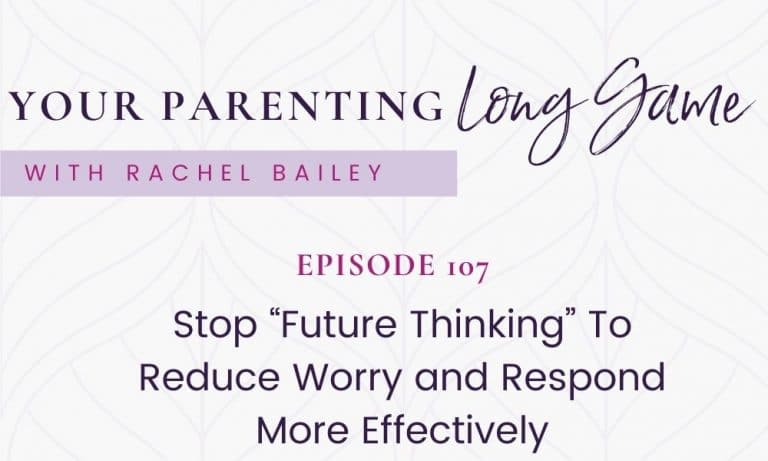Episode 201 Transcript

TRANSCRIPT: Your Parenting Long Game Episode 201 – Why Children With Big Feelings Act So “Dramatic”
Hello, and welcome to episode 201 of Your Parenting Long Game. This is the beginning of what I’m calling season two of this podcast because I’m shifting slightly the focus of both my podcast and my practice to supporting parents who are raising children with big emotions. I’m going to be offering help for children with big emotions, but also help for you as a parent and for your entire family.
I’m still going to be talking about raising resilient, responsible, and confident children, but in the context of children who tend to feel more strongly, who might be more anxious, perhaps more strong-willed, and more dramatic in their responses. I will link to the episode where I explain the reason for making this shift.
I also want to let you know, if you are raising a big-feeling child, I just put together a new free video series where I share the three keys to fostering resilience in big-emotion children without neglecting yourself or your family so that you can worry less, have fewer negative interactions, and enjoy your family time more. You can find that video series on my website rachel-bailey.com/longgame.
Until then, one of the things I want to do in these first few episodes of this season is break some misconceptions that we have about big-feeling kids. And I’m going to start with a really common misconception: that kids and even adults who have big feelings are “dramatic.”
But before I get into the kids, let me start with your perspective as a parent, because as a parent myself of two kids who feel things strongly, it’s easy for me to understand why they’re often called dramatic. People with big feelings often go from zero to 60 really quickly. One minute, you’re playing a game and they seem happy, and the next they’re livid because you moved one of the pieces of the game wrong.
Or they get upset over the smallest things. You tell your child you can’t give them their blue shirt because it’s in the laundry, and they act as if you just told them you hurt their pet hamster. They get really upset when someone gets hurt; more upset than others, maybe, when they watch movies, even cartoons; maybe they cry more; and man, if an animal gets hurt, they may get upset and angry at the injustice because it’s just not fair that an animal got hurt.
And let’s be honest about what this is like for you. When they do go from zero to 60, when things happen out of the blue, you probably feel like you have whiplash. When they get upset over the smallest things, you don’t understand why logic won’t get them out of it. Their blue shirt is in the laundry, and there’s nothing you can do. Why are they so upset? But they don’t get it. And so you’re feeling frustrated and probably very often even confused about why they’re making such a big deal about things.
When someone gets hurt, well, you get it intellectually. And you even love that they care so much, but you wonder how they’re going to be able to handle life where people and animals do get hurt with their big reactions. You worry they’re always going to think life is too much.
Here’s what I want you to know: that kids and adults with big emotions are not necessarily being more dramatic. They’re actually responding in proportion to how strongly they feel something.
You know how some people are naturally artistic? It’s just how they’re wired. Well, big-emotion people are wired to feel more strongly, whether it’s the brightness of the lights around them, the noises around them, or the fact that they can’t have their blue shirt today because it’s in the laundry. They feel it strongly.
So for some people, their blue shirt being in the laundry and their not being able to wear it is just a little disappointing. It’s like they’re carrying a two or three pound weight. It’s a little annoying, a little disappointing, but they can handle it.
To a big feeler, this type of disappointment is like carrying a 15 pound weight. One that’s really, really difficult to hold onto. It’s really big. Big-feeling kids feel strongly, and they’re often taken down by their feelings. Their reactions that you see are simply a symptom of that.
Another thing to consider: when you see dramatic behavior, it’s not usually it just the thing itself that they’re responding to. A child whose blue shirt is in the laundry? They’re just not just upset about the shirt. They’re reacting to that 15 pound weight, and they’re also reacting to all of the others they’ve had to carry that day, over and over.
Now I want to give you another example. I put together a little glimpse into what it’s like for a child with big emotions when someone, for example, does something small, like moving the game piece differently than the way they imagined in their mind.
I’ve written a letter that isn’t real. It’s based on my experiences as a big-feeling person myself, raising two big-feeling kids that I understand really well and having worked with so many hundreds of big-feeling kids, teens, and adults. This hypothetical letter tells you what it’s like to be a big-feeling kid who has just acted dramatic.
So this child has freaked out on his mom for moving a game piece when the game had — seconds before — been going so well. Here’s what it’s like for him in the form of a letter.
Dear Mom, I’m sorry I got so upset when you moved the game piece that way. I know you didn’t mean to. I know it wasn’t a big deal. The reason I got so upset is because, in my head, you were going to move it another way, and I had a really good way to respond to that one. (The one that was in my head, not the move you made.)
And I was looking forward to feeling good about my move, because I just feel like all day, most days, things don’t go the way I thought they would. Like, I’ll want a waffle for breakfast, but my sister will have already finished the waffles.
And a lot of the time I’ll raise my hand in class as high as I can. And I’ll be as quiet as I can — not yelling out, like all the others in my class. And my teacher still doesn’t call on me even though I have a really good answer I want to get out.
Or I might ask if I can go to a friend’s house, but you tell me I have to go to coding class instead. I really try to hold it together every single time I’m disappointed, because I know I’m not supposed to get upset. People get annoyed with me when I get upset.
But most days I feel like it’s wave after wave of things hitting me. And a lot of the time I can get back up after I’ve been hit by a wave.
But eventually, like when you move that game piece the way you did, I just lose it. It’s like it all added up. I’ve been knocked down too many times, held it in too many times and I just can’t get up this time.
I’m not sure how to just keep being disappointed and frustrated without being upset. Again, I’m really sorry.
So the reality is for as many times as kids are being dramatic in our eyes, that’s the number of times that they’re experiencing a big, uncomfortable feeling — one that they don’t know how to handle. Remember that feeling to them is like a 15 pound weight. Yet, they’re not equipped to lift that 15 pound weight over and over and over.
Now the good news is the more coping skills they have, the more they practice these coping skills — something we’ll be talking about a lot more in the future — the more they have and practice these skills, the more they will absolutely be able to handle those 15 pound weights. But for now, they can only handle that 15 pound weight once or twice before it just knocks them down.
So what can you do about all of this? Well, ask yourself this: What would you want to happen if you were constantly being thrown a 15 pound weight over and over, before you had the ability to carry that weight?
You probably wouldn’t want someone to say, “Why are you so weak?” Or, “Why are you having such a big reaction every time I throw you this weight?”
You’d probably want someone to say, “Oh wow, that weight might be a little bit heavy for you. Can I help you with it temporarily until you get strong enough to handle it yourself?”
And eventually you’d want them to say, “Can I teach you how to get stronger so you can carry a 15 pound weight by yourself? Because yes, they do get thrown at you sometimes. And some days, they’re thrown at you over and over. So let’s build up your strength, rather than getting frustrated that you weren’t born with it to begin with.”
So what does this look like practically?
When your child melts down when you move a piece of the game, instead of thinking, “Oh my gosh, they’re being so dramatic.” Say to yourself, why is this weight so heavy for them?”
And when your child goes from zero to 60 out of the blue, instead of thinking, “They’re being so dramatic,” say, “Why is this weight so heavy for them? Is there something else going on?”
And instead of trying to convince your child that the weight isn’t heavy, instead of saying, “You shouldn’t be upset that your blue shirt is in the laundry machine. There’s nothing that I can do about it.” Instead say, “Hey, tell me why you wanted that blue shirt so much. Let me help you carry this weight. I’m just going to sit with you here for a minute or two, until that weight becomes lighter because you’re not alone with it. Until you can carry it on your own, I’ll help you be strong — because together, we can carry anything.”
Now, one last thing I want to say: this may seem like you’ll have to help them carry weights over and over and over every day, day after day. There are two things to keep in mind.
The first is, as often as you are feeling that you’re having to carry that burden over and over and over, that’s how often they are carrying a burden. That’s how often they are being hit by this big wave that is bigger than they are, that they don’t know how to handle. Hopefully, sometimes thinking about it that way, you won’t want them to go through it alone. You’ll want to help them carry it.
And the second thing is — I will be talking about this a little bit more in a future episode — it doesn’t have to be an exhausting experience for you to help them carry this weight. And interestingly, the less exhausting it is for you, believe it or not, the less these emotions control them. So keep in mind, when you recognize that children really do feel things strongly, you might stop seeing them as being dramatic and recognize that they’re going through wave after wave of discomfort and these big feelings, they don’t know how to handle.
When you realize that your child is trying to carry 15 pounds when they’re really only equipped to carry two or three pounds — instead of getting frustrated — you might want to help them carry the burden while strengthening their ability to carry it by themselves.
Now, I do know that there are unique challenges to raising a child with big emotions. And as I mentioned earlier, I created a new free video series that explains why what you’ve tried in the past may not be resulting in long-lasting resilience for your child and what you can do to support them, yourself, and the entire rest of your family.
Feel free to find that free video seriesrachel-bailey.com/longgame. And I’ll be back soon with more tips to improve your parenting long game, especially as you are raising children with big feelings, I’ll see you then.
Follow Rachel on Instagram: https://instagram.com/rachelbaileyparenting
Join Rachel’s Facebook group: https://www.facebook.com/groups/RachelBailey/
Sign up for Rachel’s free weekly tips by email: https://rachel-bailey.com/weekly-tips/

